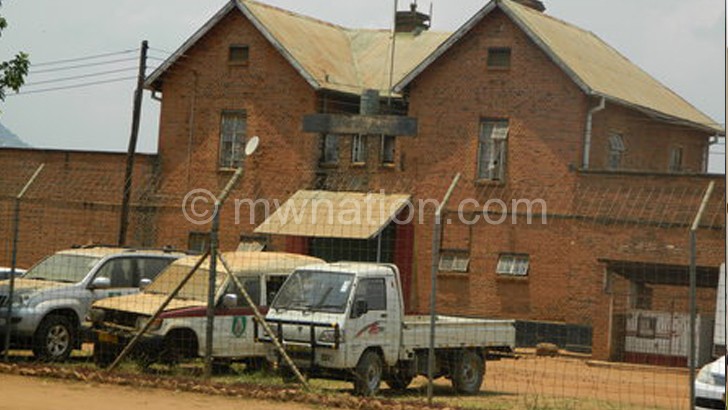‘Mentally ill’ suspect stays 16 years without trial
Douglas Malenga looks 75—much older than his age of 54. His voice breaks as he speaks and his stories don’t add up. This could be a result of staying for years under dehumanising conditions at a maximum prison in Zomba, or his suspected mental illness.
When Malenga was arrested for suspected murder of his sister in 2006, he was supposed to undergo a psychiatric test and the High Court would have decided whether he was fit to stand trial.

According to prison warders we spoke to, Malenga has been waiting for trial since 2006, because his medical results for the psychiatric test disappeared.
According to some warders, those tests had indicated that Malenga was not fit to stand trial as he was mentally ill, but the State has failed to produce the results in court.
A church chaplain, who has served the prison for years, and paralegal officers who met Malenga, all agree that he looks mentally ill.
When Nation on Sunday crew met him during a visit at the prison, he sounded incoherent in speech and made disjointed statements.
Zomba Mental Hospital is just a few hundred metres from Zomba Central Prison, yet for 13 years, authorities have failed to let Malenga undergo a test.
The office of Legal Aid Bureau, following Nation on Sunday inquiries, investigated the case and pledged to follow it up.
The bureau’s director, Masauko Chamkakala, said Malenga has never received any legal representation.
According to Chamkakala, Malenga was arrested and charged with murder in 2006. He was first remanded at Chichiri Prison and appeared in the High Court on October 25 2010.
“He went for psychiatric assessment as ordered by the court in 2010. Documents were collected by Ndirande Police. Since 2010, he has not appeared before a court of law. He was transferred to Zomba Prison some time back. As Legal Aid Bureau, we will extend the service and we will make an application for discharge for want of prosecution immediately,” he said.
But those crucial psychiatric test results have been missing.
Said Chamkakala: “We just went to Zomba Prison today and the results are apparently with Ndirande police.”
A source in the Malawi Prison Services said Malenga’s file shows that his case is due for judgment, and nothing more.
“There is no apparent reason Malenga has not been taken to court,” said the source.
As confirmed by the Legal Aid Bureau—its officers who are now investigating the matter—the results are not known, but the bureau will attempt to get to the bottom of the matter.
Executive director for the Centre for Human Rights Education and Assistance (Chreaa) Victor Mhango, whose organisation works in various prisons addressing rights issues and providing paralegal services to prisoners said, in the interview, that while shocking, the development was not strange in Malawi prisons.
Chreaa received a complaint about Malenga and other prisoners at Zomba Central Prison and the centre is working on helping the inmates receive legal redress.
Mhango blamed the situation on lack of legal representation by lawyers for murder suspects hardly avail themselves to the suspects.inmates, saying State-provided
“The problem is that most people who are on remand on homicide cases, although they are provided representation by the State, the lawyers only meet them a day before trial or on the day of trial. This leaves them unrepresented on the pre-trial issues, including cases of accused persons who have mental challenges,” said Mhango.
According to a new Prison Inspectorate report launched on September 27 2019 in Lilongwe, conditions at the overcrowded Zomba Central Prison are not appalling for inmates only, but also warders.
The report also details challenges the service is facing in record keeping, a possible explanation to situations such as Malenga’s.
“In some cases, the length of the remand may be equal to maximum sentence for the offence. For instance, in one case, at the time of visit, a remandee charged with the offence of conduct likely to cause breach of peace had been in custody for two months and his case was yet to be concluded,” reads part of the report.
Stuck in a hellhole
According to the report, remandees are held in prisons without being asked to sign for continued remand period.
Douglas Malenga was born in Chaudza Village, Traditional Authority (T/A) Njolomole, Ntcheu. His story is the typical case of a failed justice system.
The investigation also coincides with the release recently of a fresh report by the Prison Service Inspectorate which, once again, painted a gloomy picture on the state of the prisons.
The inspectorate, which is headed by a High Court judge and comprises the Ombudsman, paralegal services, NGOs and Prison authorities, among other findings, reports that “the physical structures of most of the prisons are in an extremely bad shape posing a serious danger to the lives of the prisoners and the prison officers themselves” while the overpopulation of the prisons is now at 260 percent of the official capacity.
The inspectorate concludes that the situation is a serious violation of human rights and tantamount to “torture, cruel and inhuman treatment.”
The same report, on a chapter on “Warrants of Commitment and Remand Warrants” notes negligence by officers in judiciary, police and prisons, which could lead to situations like Malenga’s.
“The team observed that some warrants were not being signed by responsible officers. In Mangochi, for instance, some warrants were being signed by another person on behalf of the sentencing Magistrate, and such officers were indicating ‘PP’ against their signature. There was a general complaint from remandees that their warrants are usually extended in their absence and sometimes without even taking them to court,” reads part of the report.





